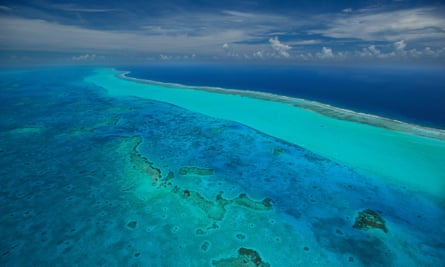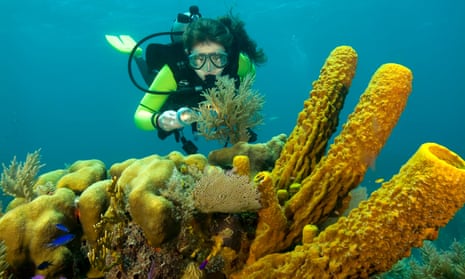Some good news for the new year: in what has been called a huge step forward in protecting oceans and marine life, the Belize government has announced bold legislation to end oil activity in all of its waters.
The move is designed to protect the fragile Belize Barrier Reef world heritage site, the second-largest in the world after Australia’s and home to 1,400 species, including endangered hawksbill turtles, manatees, rays and six threatened species of shark.
Belizean prime minister Dean Barrow’s decision to impose an indefinite moratorium marks the first time a developing country has taken such a major step to protect its oceans from oil exploration and extraction – and will help safeguard Belize’s important dive tourism sector.
“The decision is hugely significant,” said Chris Gee, of charity WWF-UK, which was part of an international campaign. “It indicates that Belize, a developing country, is prepared to put its people and environment first.”
Oil-related damage, such as a spill, could have impacts as far afield as Mexico, Guatemala and Honduras and affect the lucrative tourism industry.

Unesco inscribed the Belize reef – a 190-mile-long section of the Mesoamerican Barrier Reef System – as a world heritage site in 1996. Tourism and fisheries support half of the country’s population – around 190,000 people – either directly or indirectly.
“The reef is critical not only for the tourism industry, which employs one in every four Belizeans, but it also serves as a ‘barrier’ against storm surge and beach erosion, which will only increase with climate change,” said Dana Krauskopf, owner of Hamanasi Adventure and Dive Resort south of Belize City.
Belize is one of the most exciting dive destinations in the world: three of the Caribbean’s four atolls are found in its waters, including Lighthouse Reef atoll, location of the famous Blue Hole (described by ocean explorer Jacques Cousteau as one of the 10 greatest dive sites in the world), as well Glover’s Reef, also a world heritage site.

“Legislation to stop offshore oil drilling in Belize is an extremely wise decision,” said Ralph Capeling, co-owner of Splash Dive Center in nearby Placencia. “The economic potential of the reef clearly exceeds the value of any potential discoveries.”
There’s hope that Belize’s decision will inspire other countries. “As an avid diver for over 35 years, I think it would be remarkable for other countries to follow Belize’s lead, and take positive steps like banning offshore oil exploration and drilling,” said John Searle, owner of Sea Sports Belize in the capital.
“I was stunned to learn that President Trump recently decided to make moves to open up previously protected areas off the coast of the US to oil exploration and drilling. I guess he must have a very short memory. Can someone please tweet #deepwaterhorizon?”

Comments (…)
Sign in or create your Guardian account to join the discussion